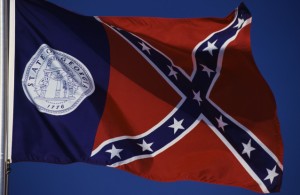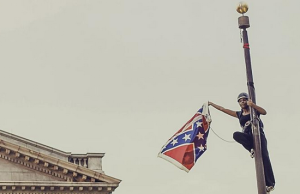When the terrible events of June 16 took place, I had little reason to think we were on our way to another debate about the Confederate flag. Yet, here we are. And while momentum builds to take down the flag at the South Carolina Statehouse, and the symbol is under siege across the nation, it is important to take stock not just of the post-Charleston reality, but of the context of the sesquicentennial of the American Civil War. An event that had largely gone by unnoticed, the sesquicentennial’s meaning is now being shaped just as we are moving on to commemorating—however we can—the anniversaries of both the Reconstruction era and the Black Power era from fifty years ago.
The collision of the Black Lives Matter movement and Confederate iconography is a curious moment in our nation’s continuing reckoning with race. Yet, I suppose it should not be a surprise that this has happened. Even without the tragedy of Charleston, Confederate flags and memorials are tempting targets for a movement expressing the anguish of living in a society that, for many of the movement’s followers, tends to see black lives as less than those of other citizens. After all, these Confederate symbols lie within both a literal public sphere, and the public sphere of memory and history. Battling over them is a proxy for larger concerns about race, but the fight is also an important one unto itself—a fight over what the Civil War and Reconstruction mean for American society.
Fighting over the Confederate flag is a tradition that stretches back to long before the last three weeks. Right here, I must make a confession, as any historian would: growing up in Georgia in the 1990s and 2000s, I remember, with little fondness, heated debates about the Georgia state flag containing the Confederate battle flag. These arguments—most vividly, one I had in ninth grade just as it appeared the flag was, finally, going to change—shaped my earliest political thoughts. They were not about abortion or the death penalty, taxes or issues of war and peace, but a flag. More specifically, a symbol,  that meant oppression to people like myself, but meant heritage or pride to some (though certainly not all) of my white colleagues.
that meant oppression to people like myself, but meant heritage or pride to some (though certainly not all) of my white colleagues.
And I do think we as historians must be careful to not dismiss this idea of “heritage” as being at the center of what the Confederate flag means for some white Southerners. Yes, there is no question that the flag, for much of its twentieth century history, has been used as a banner of white supremacy in the American South. But examining, and taking seriously, ideas of “white Southern identity” means grappling with what the Confederate flag could mean to a wide variety of people, quite a few of whom would not consider themselves racist. This is especially true of debates to take down the Confederate flag in South Carolina and Alabama, or remove it from the state flags of Georgia and Mississippi. I think of books such as Jason Sokol’s There Goes My Everything or articles such as Charles Eagles’ “Towards New Histories of the Civil Rights Era” asking historians to take greater care in considering the nuanced and complex histories of white Americans who happened to live in the American South during and after the Civil Rights Movement.
Paralleling that work, Zandria F. Robinson’s This Ain’t Chicago seeks to discover more about black Southern identity in the post-Civil Rights Era. Really, understanding that time period gives us more to think about when it comes to contemporary debates about the Confederate flag. And then there are the politics of the matter, something intellectual, cultural, and political historians will have to consider for decades to come. If the South is to forge a new identity, then Southerners—and historians—must remember the words of W. Fitzhugh Brundage’s The Southern Past
about the Confederate flag and related debates about history and memory in the last twenty years: “Debates over the South’s past are  contentious enough without the added fuel of partisan divisions and the inevitable suspicion of motives that such partisanship will engender.”[1] With the current Confederate flag debate, that has not happened yet, with Republican Nikki Haley leading the way in South Carolina. It remains to be seen if it will stay that way, however, with debates about the flag making little headway in Mississippi, and new calls across the country coming to take down monuments to the Confederate war effort.
contentious enough without the added fuel of partisan divisions and the inevitable suspicion of motives that such partisanship will engender.”[1] With the current Confederate flag debate, that has not happened yet, with Republican Nikki Haley leading the way in South Carolina. It remains to be seen if it will stay that way, however, with debates about the flag making little headway in Mississippi, and new calls across the country coming to take down monuments to the Confederate war effort.
The civil religion of the American South—so long based on symbols of the Old South, Confederate military valor, and “redemption” after Reconstruction—is undergoing its newest crisis. As the American South changes demographically, and more people of Latino/a, Vietnamese, Indian, and Arabic descent immigrate to the region, that idea of the South will change even more. For many of them, debates over the Confederate battle flag will have little to no meaning. It appears that the Confederate flag will come down in Columbia, South Carolina soon. But what that means for the idea of the South remains to be seen. It is, I hope, a sign that the South can finally be known for more than just one flag or one event.
[1] W. Fizhugh Brudage, The Southern Past: A Clash of Race and Memory. (Belknap Press: Cambridge, MA, 2005), p. 341.

0